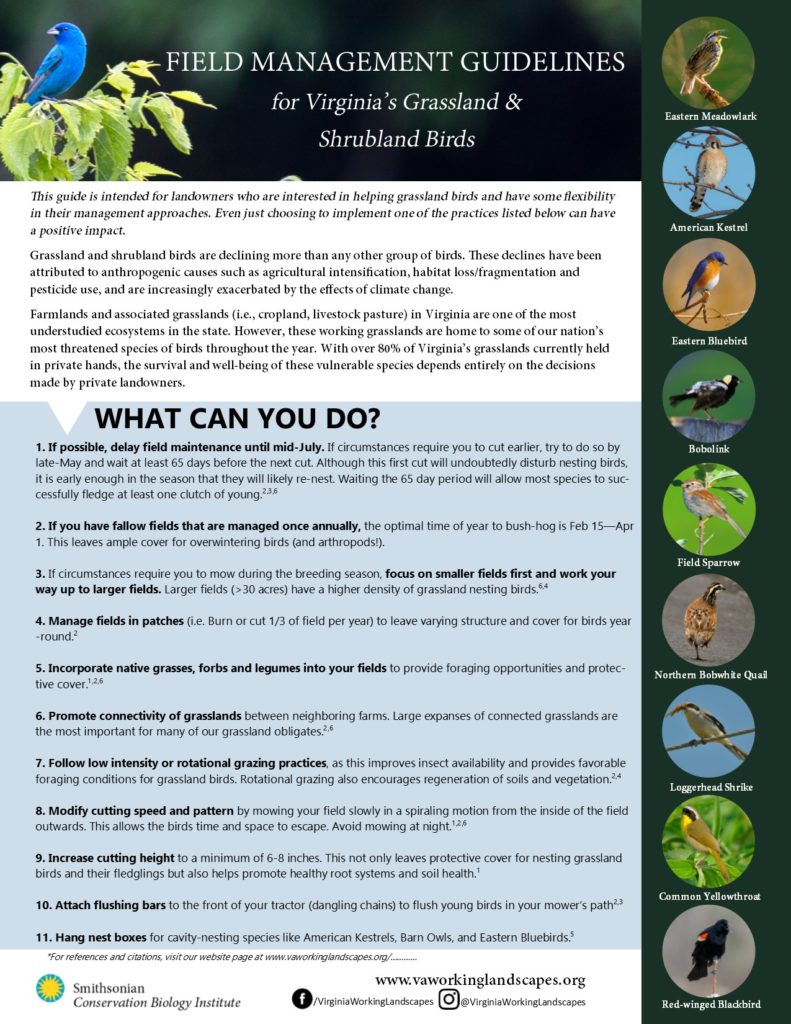FACTSHEETS AND REFERENCE GUIDES
These simple guides and quick-reference resources are great if you’re just getting started, or want to learn more about creating wildlife habitat, controlling invasive species, or finding local businesses that promote native biodiversity.
This guide is intended for landowners who are interested in helping grassland birds and have some flexibility in their management approaches. Even just choosing to implement one of the practices listed below can have a positive impact. The information in this handout is based off nearly a decade of Virginia Working Landscapes grassland research, which aims to use science to inform best management practices for biodiversity conservation. To learn more about our grassland research, click here!
References:
1 Credit Valley Conservation [CVC]. 2013. Grassland Fact Sheet. <https://cvc.ca/wp-content/uploads/2013/03/grassland-factsheet-Final.pdf>.
2 Michigan State University. 2012. Agricultural Practices That Conserve Grassland Birds. <https://www.canr.msu.edu/uploads/resources/pdfs/agricultural_practices_that_conserve_grasslands_birds_(e3190).pdf>.
3 National Audubon Society. 2012. Hayfield Mowing and Grassland Nesting Birds. <http://www.audubon.org/sites/default/files/documents/hayfield-mowing-flyer_06-25-12.pdf>.
4 Ontario Soil Crop. 2015. Grassland Workbook. <https://www.ontariosoilcrop.org/wp-content/uploads/2015/08/GrasslandBirdsWorkbook.pdf>.
5 The Cornell Lab of Ornithology NestWatch. Right Bird, Right House. <https://nestwatch.org/learn/all-about-birdhouses/right-bird-right-house/>.
6 Vermont Center for Ecostudies. 2018. Grassland Bird Conservation in New England. <https://vtecostudies.org/wp-content/uploads/2018/03/New-England-Grassland-Bird-Brochure-2018_final_proof.pdf>.
LAND MANAGEMENT GUIDES
Management guides for Virginia landowners interested in increasing native biodiversity or the abundance of specific species on their property.
TECHNICAL AND FINANCIAL ASSISTANCE
Numerous conservation programs offer cost-shares and/or incentives to promote the planting of native warm-season grasses.
SUPPORT VWL
VWL is supported 100% by grants and donations and our work is made possible by the generous contributions from our community.
The Smithsonian Institution is a 501(c)(3). All contributions are tax-deductible.
GET IN TOUCH
Virginia Working Landscapes
Smithsonian’s National Zoo and Conservation Biology Institute
1500 Remount Road, MRC 5537
Front Royal, Virginia 22630
SCBIVWL@si.edu
540-635-0035

